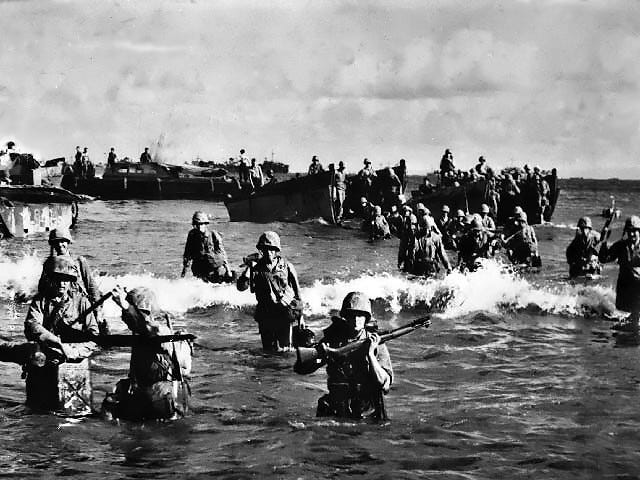TDIH: The Battle of Tinian
This victory made the Enola Gay's mission possible.
On this day in 1944, United States Marines invade the island of Tinian, in the Pacific. By August 1, they would be in possession of the island. “In my opinion,” Admiral Raymond A. Spruance would say, “the Tinian operation was probably the most brilliantly conceived and executed amphibious operation in World War II.”
It would prove vitally important, too. Tinian later became the base of operations for aircraft dropping nuclear bombs on Japan. Its relatively flat terrain made it the perfect spot for airfields.
It would all start with a surprise attack.
The Japanese were expecting Americans to hit Tinian so they had heavily fortified the beaches near Tinian Town. Much of the island was rimmed by cliffs, but the area near Tinian Town had better beaches. Another similar beach at Asiga Bay was also heavily fortified, but two smaller beaches to the northwest weren’t as well defended.
Those beaches were narrow, and it would take a great deal of planning and organization to get troops and equipment ashore efficiently, without clogging beaches.
Naturally, our Marines were up to the task.
The invasion was set for the morning of July 24. One division of Marines would distract the Japanese forces, leading them to believe that the attack was coming at Tinian Town. Meanwhile, the real invasion would be underway to the northwest.
The shelling of Tinian Town had begun weeks before the actual invasion, so perhaps no one was too surprised at the flurry of activity near Tinian Town early on July 24.
“With typical pre-landing fury,” Major Carl W. Hoffman later described, “the battleship Colorado, the light cruiser Cleveland, and the destroyers Remey and Norman Scott blasted the Tinian Town beaches and surrounding areas. Behind the men-of-war lay seven transports, carrying Marines of the 2d and 8th Regiments of the 2d Division. When, at shortly after 0600, transports actually lowered landing craft and troops clambered down cargo nets into them, the Japanese probably thought that the issue would soon be contested . . . . The bait was dangled; the Japanese took it enthusiastically.”
It was a ruse, of course. As the Japanese focused on defending Tinian Town, regiments of Marines began their planned amphibious invasion to the northwest. By the end of the day, more than 15,000 Marines had come ashore, greatly outnumbering the 9,000 Japanese troops then stationed at Tinian.
The Japanese counter-attacked the first night.
“Now the shadows were alive with about 600 leaping Japanese naval troops,” Hoffman described, “loaded with aggressive spirit, requiring no instructions to make their screaming charge. Marines called flares into action; the battlefield became light. Marines needed no orders either.”
The Marines held their ground, and the night proved disastrous for the Japanese. In a single night, the Japanese lost one-seventh of its total defense force and more than one-fifth of its infantry.
“It was there and then that the Fourth Marine Division broke the Jap’s back in the battle for Tinian,” a post-operation evaluation concluded.
In the days that followed, the Marines steadily moved inland. The island was declared secure on August 1.
Combined with other victories in the Marianas Islands, the outcome proved important. Just over one year later, the Enola Gay would depart from Tinian, famously carrying the Little Boy atomic bomb that would be dropped on Hiroshima, Japan. Three days later, a second plane left Tinian and bombed Nagasaki, too.
Japan’s surrender, as you know, followed soon thereafter.
The Greatest Generation, once again demonstrating what it means to fight for and preserve freedom.
Sources can always be found on my website, here.



What a display of strength. The battle to win control of the island of Tinian proved American superiority over the Japanese.
The island was obviously of great importance to the eventual outcome of the war.
God bless the United States Marine Corps and Navy. God bless the Greatest Generation and all who serve or have served this great nation. Thank you Tara.
The remarkable strategy of the US military at that time lead to the ultimate victory. So sad that we lost that edge in later conflicts. We have always needed great leaders to execute the battles. That’s who makes up our Medal of Honor recipients and many unrecognized warriors. Sometimes it was cunning maneuvers and other times it was sheer guts and grit. We are fortunate to have such courageous and dedicated American patriots.